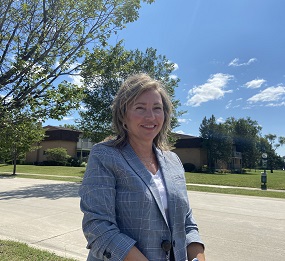Woman is Eager for the Return of Her Taste and Smell

DETROIT – Kimberly Cassey hopes to enjoy the taste and aroma of a good dinner with her family one day soon. She lost the two senses after testing positive for COVID-19 last November and waiting for them to return has tested her patience and love of food.
“It’s extremely frustrating and it wears on you mentally,” said Cassey, a Grosse Pointe Woods resident and mother of two boys. “I miss everyday things, like the experience of enjoying dinner out with my family.” Cassey is a self-described foodie who loves restaurants and all types of food, "I love sushi, I love Italian food, and Mexican food.”
 People losing smell and taste senses have become prevalent symptoms of COVID-19. Before and after people become ill with the virus, they may lose these senses entirely. Or, as in Cassey’s case, find that everyday items may smell or taste bad, strange or different. She experienced mild symptoms and has no other lingering health issues.
People losing smell and taste senses have become prevalent symptoms of COVID-19. Before and after people become ill with the virus, they may lose these senses entirely. Or, as in Cassey’s case, find that everyday items may smell or taste bad, strange or different. She experienced mild symptoms and has no other lingering health issues.
Cassey said she lost her sense of taste first almost immediately after her diagnosis. Her sense of smell went shortly thereafter and has manifested into scents of smoke, rancid meat or other odd things.
“The smells have morphed,” said Cassey. “For the most part, I smell weird chemicals or things burning all day.”
These are smells have been reported in some online forums that Cassey participates in that help her get a better sense of what she’s going through. “Some days, the smell is so intense that it gives you a headache and you want to escape it by going outside for fresh air. But you can’t because the smell is constant and it follows you,” she said in frustration.
“But the taste is gone,” she added. “I can sense when something is savory and even sour or bitter, but I can’t taste any flavor.”
Research suggests that up to 80% of people who have COVID-19 experience smell or taste dysfunction or lose their smell and taste senses. Most get it back in a week or two but for others it can be longer. Cassey is in a group of patients whose loss lags for six months or longer, said her physician, Robert Deeb, M.D., Director of Facial Plastic & Reconstructive Surgery at Henry Ford Health System.
He said Cassey may be experiencing phantom or distorted smells. “The odors vary from person to person and may be foul or present,” Dr. Deeb said.
In addition to using a sinus rinse, Dr. Deeb recommended a form of therapy to help Cassey retrain the nerves in her nose.
“We simply have patients use a few different types of over-the-counter fragrances, things like lavender or menthol or rose and just have them practice smelling them,” said Dr. Deeb. “The idea is to try and get neural pathways in those small nerve tracts working a little bit in hopes that the nerve can recover.”
Cassey tried the therapy using essential oils and spices without success. The distorted smells she’s experiencing may be a sign that the nerves in her nose are starting to wake up again, according to Dr. Deeb.
“It’s been very frustrating. Even my experience will be different than what someone else is experiencing,” she said. Despite the lingering symptoms, she keeps the situation in perspective and remains positive about the outcome.
“You just have to compartmentalize your emotions,” she said, “You can’t dwell on it because you can spin into these little depression episodes of ‘woe is me!’. My sense of smell and taste will come back when they come back, I guess.”
###
MEDIA ONLY may contact: Sal Giacona / sgiacon1@hfhs.org / 313-421-9108
###
About Henry Ford Health System
Founded in 1915 by Henry Ford himself, Henry Ford Health System is a non-profit, integrated health system committed to improving people’s lives through excellence in the science and art of healthcare and healing. Henry Ford Health System includes Henry Ford Medical Group, with more than 1,900 physicians and researchers practicing in more than 50 specialties at locations throughout Southeast and Central Michigan. Acute care hospitals include Henry Ford Hospital in Detroit, MI and Henry Ford Allegiance Health in Jackson, MI – both Magnet® hospitals; Henry Ford Macomb Hospital; Henry Ford West Bloomfield Hospital; and Henry Ford Wyandotte Hospital.
The largest of these is Henry Ford Hospital in Detroit, a quaternary care research and teaching hospital and Level 1 Trauma Center recognized for clinical excellence in cardiology, cardiovascular surgery, neurology, neurosurgery, and multi-organ transplants. The health system also provides comprehensive, best-in-class care for cancer at the Brigitte Harris Cancer Pavilion, and orthopedics and sports medicine at the William Clay Ford Center for Athletic Medicine – both in Detroit.
As one of the nation’s leading academic medical centers, Henry Ford Health System annually trains more than 3,000 medical students, residents, and fellows in more than 50 accredited programs, and has trained nearly 40% of the state’s physicians. Our dedication to education and research is supported by nearly $100 million in annual grants from the National Institutes of Health and other public and private foundations.
Henry Ford’s not-for-profit health plan, Health Alliance Plan (HAP), provides health coverage for more than 540,000 people.
Henry Ford Health System employs more than 33,000 people, including more than 1,600 physicians, more than 6,600 nurses and 5,000 allied health professionals.
.svg?iar=0&hash=F6049510E33E4E6D8196C26CCC0A64A4)

/hfh-logo-main--white.svg?iar=0&hash=ED491CBFADFB7670FAE94559C98D7798)









